
PROFILES
Justice for DC Youth
Washington, D.C.
by
After Jana’e Solomon’s brother was arrested, she was hurt and upset. Then she got busy.
Last year, she joined Justice for DC Youth, a nonprofit founded in 2001 that is fighting to reform the district’s juvenile justice system.
 JDCY believes D.C. youth are disproportionately affected by crime and the criminal justice system. It works not only to support youth in the system, but to move the system away from incarceration to education.
JDCY believes D.C. youth are disproportionately affected by crime and the criminal justice system. It works not only to support youth in the system, but to move the system away from incarceration to education.
These goals resonated with Jana’e, 21. “Being a black young woman, I have firsthand witness to some of those disparities,” she said. “I took it upon myself to kind of just get involved and see what I could do to give back and maybe prevent another life from being wasted through incarceration.”
Jana’e is part of JDCY’s "Prison to College" Pipeline project at the University of Maryland. University students and staff provide mentoring, leadership development skills and political education to incarcerated youth.
It has become a passion for Jana’e. “I had plans on going to medical school, but now I’m feeling like this is where my heart is and I’ve pretty much changed my whole curriculum,” she said.
Why do you think it’s so important to change the justice system in D.C.?
There’s so many things in D.C. that are wrong, that probably other places don’t experience, even though other inner cities probably have similar problems. But I just feel like there’s so much in D.C. that maybe people are unaware of. It’s like you think of Washington, the White House, you don’t think about the projects or the housing units that are there. So it’s kind of like it goes unnoticed.
What issues are most in need of action?
I think education. I think it really does start there. Some of our kids, you know, they’re being passed in school and they’re still reading on the third grade level and they’re in ninth grade. And it kind of sets them back, you know, it’s kind of setting them up for failure.
I think it starts with policy. Some of the rules in schools are unnecessary and a disadvantage to students. I was in a workshop the other day, and we were talking about suspension and how you can get a 10-day suspension for roaming the halls. … If you get to 10 days, then you’re suspended for the whole semester. It’s not really advantageous, you know, for students.
What kind of work are you doing now?
Right now we’re basically implementing our Prison to College pipeline. We’re doing trainings for students at University of Maryland to be able to go into the facilities and work there.
When we go there, we don’t only do workshops and tutoring. We go there to build relationships. … We play games and stuff like that. And it’s just like to know that somebody there cares about them.
What has been the biggest challenge you have faced?
The biggest challenge is that you go in and you’re not always successful. Some of the boys, they just don’t want to, for whatever reason, it may not be you. But sometimes you’re just not able to get through, or you’re not able to get things accomplished that you want to get accomplished.
Juvenile Justice Project of Louisiana
New Orleans, LA
by Tommaso Verderame, 16, Y-Press
Kyron George hasn’t had any run-ins with the law, but he still dedicates his time to helping incarcerated youth through the Juvenile Justice Project of Louisiana. 
The JJPL actively campaigns for improved conditions in youth facilities. It has succeeded in shutting down two facilities and is fighting for the closure of the Youth Study Center, a resource-starved juvenile detention center. JJPL also has programs that discourage schools from suspending and expelling troubled students and seek support services instead, and it pushes officials to offer community-based alternatives to incarceration, such as mentoring and counseling services.
Kyron, 20, has been involved with the group for three years and has served as an intern. He has been especially active in the Close the Youth Study Center campaign. “The center was in a very bad condition. They had the kids in there and at the time they weren’t receiving the proper medical attention or the proper counselors for the mentally challenged kids. They didn't have certain materials that are needed. The kids were not able to communicate with family sometimes. They were not going to school,” he explained.
While you were growing up in New Orleans, did any of your friends have trouble with the juvenile justice system
I had a lot of friends that were abused by the system or placed in it. And like just from their stories alone, I could just tell that it wasn’t a good thing. And just sitting around and talking about it or hearing about it made us aware of what was going on and made us feel like we needed to change it.
Why do you think Louisiana’s rate of youth incarceration is among the highest in the United States?
It comes from many different reasons, such as the surroundings of the youth, having to fit a certain standard or be a certain way. That really causes them to act out. It’s also having a lack of parents, or not having an adult or a person in your life to help you out with certain situations, or feeling like you have no one.
Why do you think Louisiana has kept the Youth Study Center open for so long?
Honestly, from the way I look at it, it’s the politicians and the administration that’s over the building, not knowing where the funds are going and not having the community involved in it as well. It’s just been like out of range.
Why do you devote time to doing this?
Just to be able to help the youth, period, if not better the city, at least have an impact on the youth where you can kind of slow down the crime rate and rehabilitate in a way.
Youth Justice Coalition
Los Angeles, CA
by Moira Corcoran, 12
 Maritza Galvez, 17, was introduced to the California justice system at age 12, when her mother was incarcerated. During that difficult time she found out about the Youth Justice Coalition from a friend.
Maritza Galvez, 17, was introduced to the California justice system at age 12, when her mother was incarcerated. During that difficult time she found out about the Youth Justice Coalition from a friend.
The Youth Justice Coalition works to end mass incarceration of youth and to end inequality in the justice system stemming from race, nationality and class. Some of the YJC’s members have served time in detention centers or prisons while others have friends or family who have been involved in the legal system.
One of YJC’s bigger projects is trying to stop prosecutors from trying youth as adults in court. The group also is committed to seeing that youth detained in adult prisons receive the education, mental health, and substance abuse counseling that they need.
Galvez works as a youth organizer for the Youth Justice Coalition part time and attends the coalition’s free high school. Though her mother’s case was dropped and she was released from prison, Maritza found she really liked the work she was doing and wanted to continue. She didn’t want the next generation to go through the same experience she did.
How are youth involved in YJC?
The core youth organizers group is called the LOBOS. It stands for Leading Our Brothers and Sisters Out of the System. We are the ones that organize and coordinate upcoming actions and events. We mobilize our community and our youth center. We are the voice of our organization. You can find us at our office working on the 50-Mile March 4 Respect (we march 50 miles each year demanding respect for all youth behind bars) or you can find us meeting with an elected official talking about alternatives to incarceration.
What are you currently working on?
We have many campaigns and one of our campaigns right now is Stop the Killings,”which basically consists of getting more gang intervention workers on our streets. In California, we have these maximum security juvenile detention centers that are called California Youth Authorities, and because of the work that the YJC, along with other youth organizations and juvenile justice organizations, have done and the lawsuits that were brought about because of the conditions, we’ve actually reduced the population by 50 percent.
What has been your greatest challenge as a youth organizer?
It’s hard sometimes as a youth organizer … because of the simple fact that ageism exists, and because people seem to believe that just because you are younger, you don’t know what you’re talking about. But the truth is that my experiences are my experiences, and even though I’m young I know what I’m saying.
What do you consider your biggest success?
We’ve had many successes, but I think that the day we have the biggest success will be the day we actually start building community centers in our community, the day we actually have alternatives to incarceration in neighborhoods. When we start focusing on youth development instead of incarceration, that’ll be the day.




